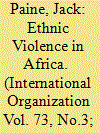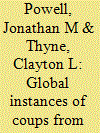| Srl | Item |
| 1 |
ID:
115728


|
|
|
|
|
| Publication |
2012.
|
| Summary/Abstract |
Previous studies have attested to leaders "coup-proofing" their regimes by reducing the ability or disposition of their armies to seek their removal. The following article tests the utility of these efforts. "Structural" coup-proofing such as counterbalancing is expected to reduce the ability to organize a coup plot by creating substantial coordination obstacles to soldiers. Coup-proofing by spoiling militaries with organizational resources is expected to reduce the willingness to intervene. However, increased organizational resources are expected to increase the army's capabilities, thereby increasing the likelihood of a coup's success. The theory is empirically tested using a selection model with a global sample from 1961 to 2000. Findings suggest that both coup-proofing strategies are effective deterrents of coup activity and, more generally, that characteristics of the military appear to be far more important than economic influences on coups.
|
|
|
|
|
|
|
|
|
|
|
|
|
|
|
|
| 2 |
ID:
168201


|
|
|
|
|
| Summary/Abstract |
What explains differential rates of ethnic violence in postcolonial Africa? I argue that ethnic groups organized as a precolonial state (PCS) exacerbated interethnic tensions in their postcolonial country. Insecure leaders in these countries traded off between inclusive coalitions that risked insider coups and excluding other ethnic groups at the possible expense of outsider rebellions. My main hypotheses posit that PCS groups should associate with coups because their historically rooted advantages often enabled accessing power at the center, whereas other ethnic groups in their countries—given strategic incentives for ethnopolitical exclusion—should fight civil wars more frequently than ethnic groups in countries without a PCS group. Analyzing originally compiled data on precolonial African states provides statistical evidence for these implications about civil wars and coups between independence and 2013 across various model specifications. Strikingly, through 1989, thirty of thirty-two ethnic group-level major civil war onsets occurred in countries with a PCS group.
|
|
|
|
|
|
|
|
|
|
|
|
|
|
|
|
| 3 |
ID:
103724


|
|
|
|
|
| Publication |
2011.
|
| Summary/Abstract |
Once considered a 'hot topic' among scholars, research on coups d'état has waned in recent years. This decline is surprising given that 7 coups have happened between January 2008 and December 2010, bringing the last decade's total to almost three dozen. One explanation for the lack of coup research is the absence of a temporally and spatially comprehensive dataset to test theories. Also absent is a discussion of what makes coups distinct from other forms of anti-regime activity. This article seeks to remedy these problems. The authors present a new dataset on coups from 1950 to 2010. They begin by explaining their theoretical definition and coding procedures. Next, they examine general trends in the data across time and space. The authors conclude by explaining why scholars studying a variety of topics, including civil wars, regime stability, and democratization, would benefit by paying closer attention to coups.
|
|
|
|
|
|
|
|
|
|
|
|
|
|
|
|